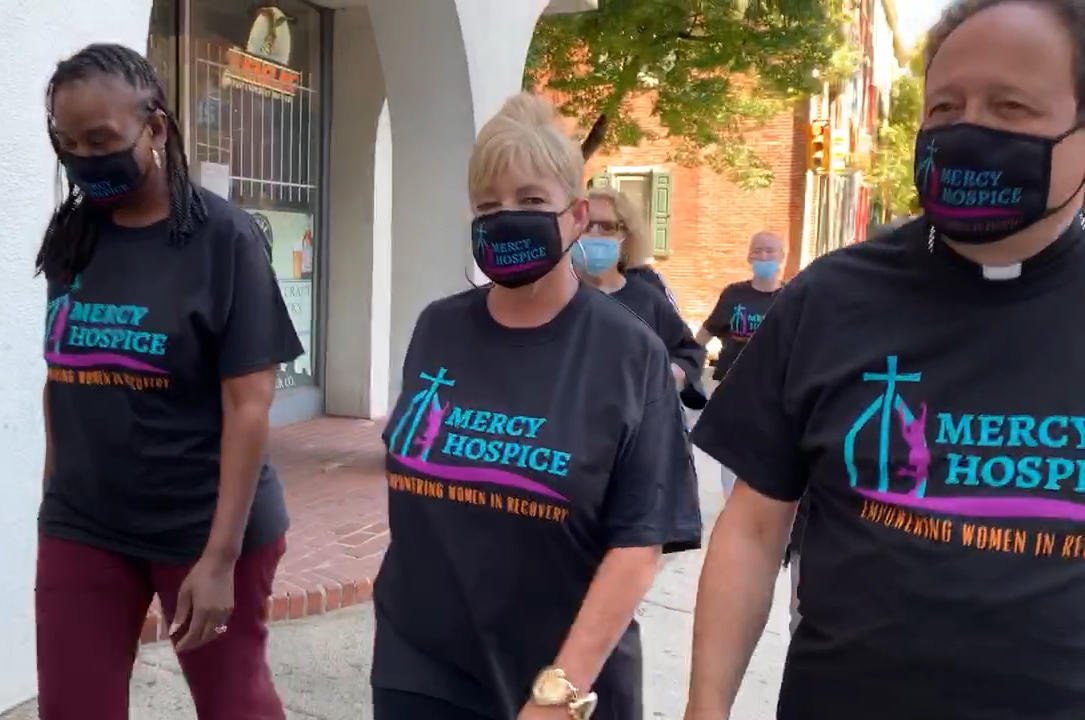A group of area women laced up their sneakers yesterday for a walk in support of those recovering from addiction.
Some 15 residents of Mercy Hospice and Women of Hope partnered for a Sept. 22 stroll through Center City, added their steps to thousands of others during National Recovery Month, an awareness campaign sponsored by the U.S. Department of Health and Human Services.
Joining the participants were Philadelphia Auxiliary Bishop John McIntyre; Amy Stoner, director of the community-based and homelessness divisions of archdiocesan Catholic Social Services (CSS); Renee Hudson-Small, assistant director of CSS’s housing and homeless services and current director of Mercy Hospice; and Women of Hope director Rosemary Chetalo.
Operated by CSS, Mercy Hospice provides shelter, case management, life skills and parenting education to women overcoming substance abuse.
CSS’s Women of Hope provides similar services for females experiencing mental health issues, which have been shown to correlate significantly with substance abuse.
[hotblock]
For the past decade, both outreaches have participated in the annual Pro-Act Recovery Walk, sponsored by the Council of Southeast Pennsylvania.
Due to COVID concerns, the event – which in recent years has drawn some 25,000 participants – was reconfigured as a virtual Sept. 12 gathering. Throughout the month, individual and small group walks have been organized in solidarity with the online celebration.
For Mercy resident Mic (short for “Michelle”), Tuesday’s scaled-down versions was just fine, since getting in step with sobriety is what really matters.
“It means the beginning of a new lifestyle for me,” she said, noting that she had “been in and out of jails and all kinds of institutions over the years.”
“I’ve been in and out of addiction for so long that I never even really considered recovery,” Mic admitted. “To be a part of this just gives me a whole different perspective on how I can live my life, and I like it.”
Marcey Canalichio, a certified care specialist at Mercy Hospice, said that the walk was an acknowledgement of what she and her team do every day.
“We bond together,” she said. “Recovery is hard, and this is a way to know you’re not alone.”
The COVID pandemic has presented a number of particular challenges for those struggling with addiction. Substance abuse, which compromises heart and respiratory health, increases the risk of contracting the virus. At the same time, lockdown policies have intensified the isolation and anxiety that often trigger addiction, while limiting access to in-person treatment options.
Hudson-Small said Mercy residents have discovered their previously untapped creativity under COVID restrictions.
“One of our ladies decided to buy a karaoke machine and donate it to the house,” she said. “Now they have weekly karaoke, and they’ve found out that some people here have some very nice voices.”
Chetalo said the visual and culinary arts have flourished at Women of Hope during the pandemic.
“Our ladies have been decorating,” she said, laughing at the “thousand bulletin boards” throughout the facility that are now sporting a new look.
In addition, residents have been cooking dishes from various cultures and serving them to day guests, said Chetalo.
Exploring “all the beautiful things God invites us to do on earth” is one of the many rewards of recovery, said Mic, a music lover who plays drums and keyboards.
Such joy eliminates “the need to infest (the) brain with a chemical to feel good,” she stressed, adding that she now plans to assist others in achieving their dreams.
“I didn’t know I could feel this good while clean, to be honest, and it’s beautiful,” she said. “I have a goal to be sitting behind a desk, helping other people recover and feel what I feel right now.”
PREVIOUS: Archbishop Pérez welcomes students back to Delco school
NEXT: Four schools in archdiocese receive National Blue Ribbon honor




Share this story